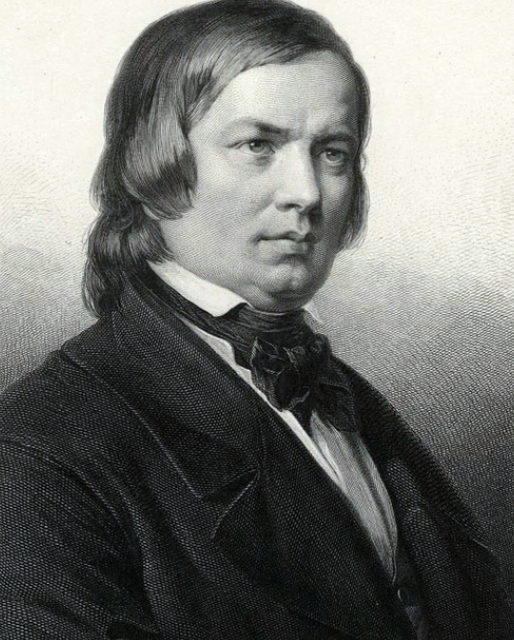Table of Contents
Introduction
In this article I would like to talk to you in the most practical and concise way possible about the figure of Robert Schumann, critic and scholar as well as composer and pianist: this fascinating figure of Music reveals the results of a marriage between letters and musical notes. Schumann in fact studied literature from a very young age, and this keen interest was reflected in all his musical production. I will try to get to the point of the salient issues related to his biography, leaving out those more “catalog” aspects that you could read anywhere online and offline.

Literature And Composition
Schumann once said that he learned more from Literature than from Composition. If we look at his musical and non-musical production, we notice that actually from a young age he tried his hand at writing stories, poems and dramas. From the age of thirteen until his death, his passion for the Letters never left him. This precocity in writing must certainly have sensitized him to the subtleties of reading. He was very impressed by the works he read, in particular once he was fascinated by the conflict between the twins Walt and Vult that is found in the novel Flegeljahre, a title that we could translate with Anni Acerbi. In these two figures he reflected the most extreme traits of his personality: fantasy and rationality, which are not by chance personified in the novel by the twins, to represent the opposite concepts of reality and ideality. His father had a large number of books, being a publisher: this must certainly have influenced little Robert, who at eighteen following his death moved to study Law. This wealth of readings, poems, literary compositions written in these first five years as an artist, with his father still alive, will represent an essential wealth for his musical production.
Meeting Paganini
Just as it happened for Franz Liszt, whose article you can find here, for Schumann the meeting with Paganini was crucial. He composed in 1832, six years after moving to study Law, the Studi op. 3 for Piano. Below you will find a virtuosic version of these studies. Following the example you will find a banner through which to buy the paper version of the score. If you buy it from the banner below, a small percentage will go to support this blog.
The meeting with Paganini was also crucial for the confrontation with the ideal of transcendental perfectionism, a theme that many musicologists try to understand if it had been “castrated” in Schumann by the early hand injury. This injury, perhaps not by chance occurred in the same year of composition of the Op. 3, abruptly interrupted the piano career of Schumann who was forced to devote himself to Composition and music criticism.
The Aesthetic Conception
Although Schumann was a full-fledged Romantic musician, he did not conceive of Romanticism in that traditional way that we have already talked about in a special article. Schumann writes that Music is romantic when it reflects the “combinatorial-profound, the poetic, the humorous”. The greatest exponent of romantic music was for Schumann the supreme composer J. S. Bach, of which you can find our article here. This statement, nowadays, sounds almost contradictory: to call Bach a romantic composer would be madness for so much of our Musicology. Yet Schumann saw in Bach the supreme architect of Counterpoint, an art through which he could merge fantasy and rationality. It is no coincidence that many of his compositions will have a contrapuntal character and will follow, to some extent, Bach’s poetics. The use of Counterpoint very often alluded to literary contents, which Schumann never failed to address in the sense of a deepening, of the revelation of perspectives contained in the text that Music is able to bring out. In this he was a great Master in avoiding descriptivism, since this continuous allusion to the titles of Literary works could easily have fallen into a pleonastic and quotationistic musical rendering. He probably managed to avoid descriptivism also because he always conceived of Composition as an unconscious process.
Personal Life
We know that around 1833 he fell in love with fourteen-year-old Clara Wieck, a future composer and pianist, about the private Schumann. Clara was a pupil of Schumann’s Master: he strongly opposed the union of the two, opposed the marriage to the end. Schumann meanwhile, in the same year, began to perceive the signs of what will be a chronic psychic illness. In 1840, Clara and Robert were also married and had eight children. Unfortunately, the private life of the composer from Zwickau was a continuous oscillation between the ups and downs of the disease, until the attempted suicide in the Rhine, dated 1854. Two years later Schumann, hospitalized in a nursing home, died of causes not yet fully clarified. In recent years, the ever-increasing difficulties of Schumann’s relationship with the people around and around him, probably exacerbated by his difficult health condition, are highlighted among the various reports. To Clara, with whom he had a very deep bond, he directly and indirectly dedicated many compositions, including the Kreislerian Op. 16, the collection of lieds Myrthen Op. 25, which the composer offered as a wedding gift to his Clara, a part of the Carnaval Op. 9 and so on. I leave you below listening to these three wonderful works, as always you find the banners for the purchase of the relative scores: a small percentage of the sale goes to support the blog.
Conclusions
For this brief introduction to Schumann is everything, we will have the opportunity to talk in more depth about this great composer in subsequent articles. Do not forget to follow us daily so as not to miss the next updates, we will see you in tomorrow’s article!
- History Of The Piano – The Fortepiano - July 12, 2022
- Curt Sachs – History Of Organology At a Glance - July 8, 2022
- Giuseppe Verdi – Rigoletto, Il Trovatore, La Traviata - June 29, 2022
